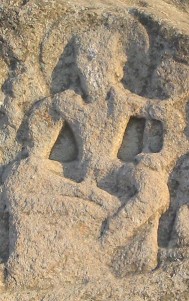Gymnosophists
Gymnosophists ("naked philosophers"): Greek expression for the sages of India (saddhus) and a group of sages in southern Egypt or Nubia.
India

The expression "gymnosophist" is used for the first time in a story about the Macedonian conqueror Alexander the Great, who visited the Punjab and the valley of the Indus in 327-325 BCE. In this story, ten "naked sages" are questioned by the king and give all kinds of smart answers.note It is not clear when this story was written, but the oldest version, a papyrus now in Bern, dates back to the first century BCE. The word "gymnosophist" must, therefore, at that moment have been current.
However, it was an unusual expression. Most historians of Alexander's campaign called the Indian sages "brahmans" and later authors followed this usage. In Plutarch's version of the anecdote of the ten sages, they have become brahmans. Still, it is likely that Alexander's contemporaries understood that there were several types of philosophers in India. For example, admiral Nearchus was aware that at least one Indian, a man called Calanus, was not a brahman. He, and the ten gymnosophists, must have been saddhus.
Brahmans belonged to the mainstream of Indian religion, which is, in this period, called Brahmanism. They were members of the priestly caste, advised the political leaders, and lived in the cities. Saddhus, on the other hand, lived outside the towns and were skeptical about Brahamanist orthodoxy. Their criticism had great influence on the development of Indian spiritual life; some of their ideas were integrated in Brahmanism and can still be found in modern Hinduism, others were not accepted but found their way to Jainism and Buddhism, which were defined during the reign of the Maurya dynasty.
These theological developments were unknown to the Macedonian and Greek visitors, and in the Greek language, "brahmans" and "gymnosophists" were synonyms. It was believed that Greek philosophers like Pythagoras had visited India and had studied with the gymnosophists, which are usually presented as pious men who believed in the transmigration of the soul and abstined from meat and wine.
Egypt
In the first half of the third century CE, the sophist Philostratus, the author of the Life of Apollonius, applies the expression to sages living in Nubia (i.e., southern Egypt or northern Sudan). They are presented as less wise than the Brahmans of India.
Although the sophist claims that he found this information in one of his sources, the Scraps from the manger by Apollonius' disciple Damis, it is a bit strange that they are not mentioned elsewhere. The possibility that reports about an ascetic community in the Egyptian desert, like the Christian desert fathers or the Therapeutae who are mentioned by Philo of Alexandria, influenced Philostratus' story, cannot be excluded.